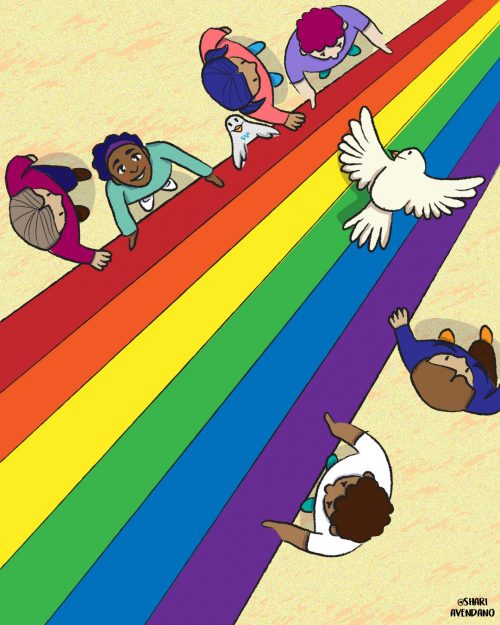3 de julio, 2023
Por Facundo R. Soto
El movimiento LGBTTIQ, del que formo parte de distintas maneras, ya sea desde la dirección de una diplomatura en la UFLO (Universidad de Flores) de Diversidad sexual donde reconstruimos la historia de los colectivos LGBTTIQ en la Argentina y en Latinoamérica, hasta mi producción de textos y entrevistas en el diario Página 12, Suplemento SOY (LGBTTTIQ), medio de comunicación en el que trabajo desde hace 10 años, hasta mi participación activa en distintos espacios, como lector de mis textos gay queers en centros culturales, así como también jugando al fútbol en equipos de diversidad sexual GAPEF (Gays Apasionados por el Fútbol).
Metido en el colectivo LGBTTIQ y atravesado por él, puedo decir que las personas con género y/o orientaciones sexuales disidentes tenemos cada vez más visibilidad y espacios en los medios de comunicación masiva. Fueron muy importantes la Ley de Matrimonio Igualitario, promulgada en la Argentina en el 2010 y la Ley de Género en el 2012, dado que abrieron puertas, no solo desde el reconocimiento de partes y gente que no forma parte de nuestra comunidad LGBTTIQ; sino a nivel legal. Estas leyes, al estar vigentes, posibilitaron que hoy casi todas las universidades tengan protocolo de género, es decir, un Reglamento Interno donde no se tolera y se sanciona (por ley) la discriminación en todos sus aspectos, se exige respeto a las personas que eligen tener un género diferente al biológico, respetando el nombre y el género con el que la persona se percibe, más allá del que figura en su DNI (además de tener la posibilidad de cambiar éste donde figure el de su autopercepción), así como también se exige respeto por las sexualidades disidentes condenando el bulling, ya sea provocado a personas internas de las universidades (estudiantes, plantel docente y no docente) como externo (estudiantes) o intermedio (proveedores, etc.). De esta manera, el amparo legal a las personas disidentes posibilita que no tengamos más que esconder nuestra identidad o nuestra condición sexual. La visibilidad empieza a expandirse y los documentales, festivales y obras de arte LGBTTIQ se reproducen minuto a minuto.
Desde hace 10 años contamos con un suplemento LGBTTIQ que sale todos los viernes en uno de los diarios más prestigiosos y masivos de la Argentina, Página 12. En el cual escribo desde sus inicios y el cual no presenta ningún tipo de censura, es totalmente libre; ya sea desde el contenido de sus notas hasta la prosa con la cual escribimos (en muchos casos usamos lenguaje soez y abyecto, provocamos a los moralistas y tenemos todo el apoyo del diario). También escribimos y desarrollamos el lenguaje inclusivo, que cada vez se implemente más en distintas esferas de nuestra sociedad.
Cada vez hay más agrupaciones LGBTTIQ que se desprenden de partidos políticos, grupos independientes, espacios dentro de espacios culturales, universidades que cuentan con oficinas de género, diplomaturas en diversidad sexual, etc.
Esto no excluye determinados ambientes homo/lesbo/ trasnfóbicos, como son algunos espacios religiosos/militares. Mientras que en otros, como por ejemplo la Base Militar de Campo de Mayo cuenta con una oficina de Diversidad, donde cualquier persona que se sienta discriminada, ya sea por su condición sexual, género autopercibido, así como por su raza o nacionalidad, podrá denunciar a las personas que no lo respeten. Con esto quiero decir que hemos ganado mucho terreno en cuanto a derechos. Pero todavía falta mucho.
A look at the Argentine LGBTTIQ collective
By Facundo R. Soto
The LGBTTIQ movement, of which I am part of different ways, either from the direction of a diploma in the UFLO (University of Flores) of Sexual Diversity where we reconstruct the history of the LGBTTIQ groups in Argentina and Latin America, until my production of texts and interviews in the newspaper Página 12, SOY Supplement (LGBTTTIQ), media in which I have been working for 10 years, until my active participation in different spaces, as a reader of my gay queers texts in cultural centers, as well as playing to soccer in teams of sexual diversity GAPEF (Gays Passionate about Soccer).
Inserted in the LGBTTIQ collective and crossed by it, I can say that people with gender and / or dissident sexual orientation have more and more visibility and spaces in the mass media. The Equal Marriage Law was very important, promulgated in Argentina in 2010 and the Gender Law in 2012, since they opened doors, not only from the recognition of parties and people who are not part of our LGBTTIQ community; but at the legal level. These laws, being in force, made it possible for almost all universities to have a gender protocol, that is, an Internal Regulation where discrimination is not tolerated and sanctioned (by law) in all its aspects, respect is demanded of people who they choose to have a different gender to the biological one, respecting the name and the gender with which the person is perceived, beyond the one that appears in their DNI (besides having the possibility of changing this one where the one of its self-perception appears), as well as Respect for dissident sexualities is demanded by condemning bulling, whether provoked to internal people of the universities (students, teaching and non-teaching staff) as external (students) or intermediate (providers, etc.). In this way, the legal protection of dissidents allows us to hide our identity or our sexual condition. Visibility begins to expand and documentaries, festivals and LGBTTIQ art works are played minute by minute.
For 10 years we have an LGBTTIQ supplement that goes out every Friday in one of the most prestigious and massive newspapers in Argentina, Page 12. In which I write from its inception and which does not present any type of censorship, it is totally free; either from the content of his notes to the prose with which we write (in many cases we use foul and abject language, we provoke the moralists and we have the full support of the newspaper). We also write and develop inclusive language, which is increasingly implemented in different spheres of our society.
More and more LGBTTIQ groups are emerging from political parties, independent groups, spaces within cultural spaces, universities that have gender offices, diplomas in sexual diversity, etc.
This does not exclude certain homo / lesbo / trasnphobic environments, such as some religious / military spaces. While in others, for example, the Campo de Mayo Military Base has a Diversity office, where any person who feels discriminated, either because of their sexual condition, self-perceived gender, as well as their race or nationality, may denounce to people who do not respect it. By this I mean that we have gained a lot of ground in terms of rights. But there is still a lot left.


